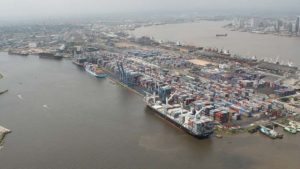
By Kenneth Jukpor
Despite the massive investment in seafarers development by the Federal Government championed by the Nigerian Maritime Administration and Safety Agency (NIMASA), indigenous shipowners have joined foreigners in prioritizing seafarers with foreign certification.

This discrimination formerly popular among foreign companies has become evident in Nigeria with several indigenous companies including the Nigeria LNG Limited (NLNG), a liquefied natural gas (LNG) producing company with the government as a shareholder.
A Seafarer, Engr. Daniel Ikueyemi revealed this at the weekend during an interview with Maritime TV, even as he posited that the poor feedback mechanism at NIMASA has deprived the agency of the true impact of the investment in seafarers’ development.

“NLNG rejects seafarers with Nigerian CoCs. NLNG is a company in which the nation has shares. If this certificate doesn’t have value in our country and organizations like NLNG reject it, there is no need talking about acceptability of this certificate around the globe. There is no point wasting our time on that,” he said.

Ikueyemi proposed that NIMASA creates a seafarers’ desk at the agency with the onus of receiving valuable information and experiences of seafarers especially on practices onboard vessels.
According to him, this can be an avenue to enable the agency resolve the numerous problems associated with seafaring, as “NIMASA would better capture seafarers experiences.”
Ikueyemi lamented that most seafarers trained under the Nigerian Seafarers Development Programme (NSDP) are on the verge of having their Certificates of Competence (CoC) expire, yet they have no resources to renew it because they never had an opportunity of going onboard vessels even for a single day.
His words: “NIMASA shouldn’t allow their resources waste away because that is what happens when the seafarers aren’t engaged. The duration of CoC is five years and it becomes useless if one doesn’t utilize it during that timeframe.”
“Imagine the millions of dollars that has been spent on NSDP already. Nevertheless, NIMASA can’t give account of the number of cadets they have trained so far. A lot of people have left the system unnoticed.”
On the discrimination of Nigerian seafarers because of the quality of their CoCs, he said; “Every Nigerian that goes to have his or her CoC outside the country already understands the issue of discrimination. It has become a common thing for us. Discrimination against those operating with Nigerian CoCs has become the norm. Nigerian seafarers are already discriminated. So the discrimination resulting from the CoCs becomes discrimination out of the discriminated. Our CoCs are now discriminated among the discriminated CoCs.”
“We don’t need to go far to talk about how other countries discriminate seafarers with Nigerian CoCs. The discrimination is evident in Nigeria. There are lots of companies in Nigeria that state clearly that they want seafarers with foreign CoCs. These are companies operating on Nigerian waters.”
Ikueyemi who is also Marine Engineer and a product of NSDP, also condemned NIMASA’s practice to only issue unlimited certificates to Officer On Watch (OOW).
Meanwhile, he encouraged NIMASA to have Memorandum of Understanding (MoU) with several countries for seafarers’ engagement, especially African nations in dire need of seafarers.
“We shouldn’t only focus on the Western countries for such partnerships. There are lots of African nations in dire need of seafarers and we can start from Africa. The essence of having MoUs with African nations shouldn’t only be to lobby for IMO Council elections. Nigerian seafarers can have privilege to work in other African countries with these MoUs,” he said.
He also stressed the need to improve the quality of Nigerian CoCs so that it can’t be easily forged, noting that around the globe there is a perception that Nigerian CoCs can be easily forged.
According to him, these perceptions further reduces the value of Nigerian CoCs, adding that a lot of people with the Nigerian CoCs never attended the required classes to sit for it, meanwhile a lot of those who have taken the classes don’t have the ability to pass the examination for the CoC.
“We have discovered from the studies and data collected that more than 50% of the people who sit for the examinations say that there is no correlation between what is taught in class and the curriculum for the examination. The curriculum given for the examination is obviously different from what is done in the classes,” he posited.
He also lamented the long waiting time for results of CoCs which takes almost one year in Nigeria, whereas other nations complete the process in one week or one month at most.
 MMS PLUS NG – Maritime, Aviation, Business, Oil and Gas News Online Newspaper with coverage in Maritime, Oil and Gas, Aviation, Power and Energy as well as Financial News
MMS PLUS NG – Maritime, Aviation, Business, Oil and Gas News Online Newspaper with coverage in Maritime, Oil and Gas, Aviation, Power and Energy as well as Financial News









